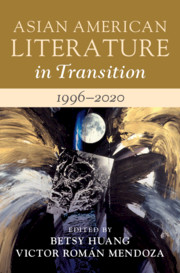Book contents
- Asian American Literature in Transition, 1996–2020
- Asian American Literature in Transition
- Asian American Literature in Transition, 1996–2020
- Copyright page
- Contents
- Illustrations
- Contributors
- Series Preface
- Acknowledgements
- Introduction
- Part I Neoimperialisms, Neoliberalisms, Necropolitics
- Chapter 1 Transpacific Ecological Imagination
- Chapter 2 The Garden in the Machine
- Chapter 3 Writing Asia-Latin America
- Chapter 4 States of Violence
- Part II Intersections, Intimacies
- Part III Genres, Modalities
- Part IV Movements, Speculations
- Bibliography
- Index
Chapter 4 - States of Violence
9/11, the “War on Terror,” and South Asian, Arab, and Muslim American Literature
from Part I - Neoimperialisms, Neoliberalisms, Necropolitics
Published online by Cambridge University Press: 27 May 2021
- Asian American Literature in Transition, 1996–2020
- Asian American Literature in Transition
- Asian American Literature in Transition, 1996–2020
- Copyright page
- Contents
- Illustrations
- Contributors
- Series Preface
- Acknowledgements
- Introduction
- Part I Neoimperialisms, Neoliberalisms, Necropolitics
- Chapter 1 Transpacific Ecological Imagination
- Chapter 2 The Garden in the Machine
- Chapter 3 Writing Asia-Latin America
- Chapter 4 States of Violence
- Part II Intersections, Intimacies
- Part III Genres, Modalities
- Part IV Movements, Speculations
- Bibliography
- Index
Summary
Though violence is endemic to the founding of the US nation-state, this chapter focuses on the violence inflicted on certain types of individuals following the attacks of September 11, 2001 that set in motion the USA’s “global war on terror.” Through engaging poems, novels, and plays by South Asian, Arab, and Muslim American writers, this chapter seeks to answer three basic questions. (1) In the period after September 11, 2001, which subsets of the US population have been deemed most problematic, and why? (2) Is there political and popular will to imagine these populations as welcome members of the US body politic? (3) How can these populations be envisioned as important and productive additions to the nation, and what is the advantage of so doing? The chapter argues that a perpetual state of suspicion and hostility against certain groups of people weakens a nation and slowly erodes those bonds of “imagined community” that give a country its strength and resolve. To be in a state of high alert, to be always primed for conflict, depletes a nation’s resources and distracts it from focusing on the future. The literary texts reveal that negative emotions attenuate a nation’s capacity to imagine a future that is generative and enriching, and, instead, trap the nation in a never-ending cycle of fear, watchfulness, and mistrust of residents.
- Type
- Chapter
- Information
- Asian American Literature in Transition, 1996–2020 , pp. 75 - 96Publisher: Cambridge University PressPrint publication year: 2021

